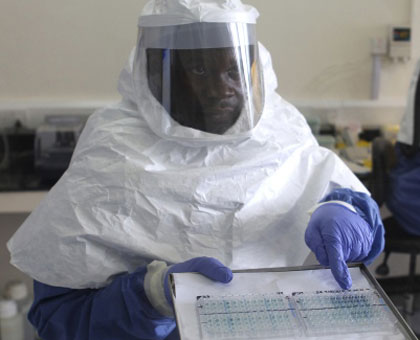There was a sigh of relief yesterday when test results for the patient with Ebola-like symptoms who was last Sunday isolated at King Faisal Hospital Rwanda returned negative.


There was a sigh of relief yesterday when test results for the patient with Ebola-like symptoms who was last Sunday isolated at King Faisal Hospital Rwanda returned negative.
The patient, a German national who reportedly flew into the country from Sierra Leone nearly two weeks ago, was later moved to an isolation facility at Rwanda Military Hospital, Kanombe.
But in a statement yesterday, the Ministry of Health said the results from the samples that were taken from the patient for Ebola tests and done at an internationally-accredited laboratory were negative.
According to the ministry, the patient does not suffer from Ebola hemorrhagic fever, but was "recovering well from malaria.”
Remain vigilant
The government says there is no Ebola in the country "but due to population movements, there is risk that Ebola can spillover to Rwanda at any time.”
The public is urged to remain vigilant and report any suspected cases immediately, the ministry said in the statement.
Ebola hemorrhagic fever is not an airborne disease.
Ebola, unlike airborne illnesses that can be easily transferred from respiratory droplets exposed from the mouth, is a highly contagious disease transmitted through contact with bodily fluids of an infected person.
It is characterised by fever, headache, joint and muscle pain, sore throat, weakness, diarrhea, vomiting, abdominal pains and bleeding from all body openings.
Manifestation of Ebola, according to health official begins abruptly with a sudden onset of an influenza-like stage characterised by general malaise, fever with chills, sore throat, severe headache, weakness, joint and muscle pain, and chest pain.
"The ministry through its emergency preparedness team continues to take actions for preparedness and response to prevent potential risks that might be caused by Ebola and, surveillance systems and emergency management systems are in place,” the statement added.
Among others, health workers have been trained across the country and are vigilant – to enable timely detection, notification and appropriate management of any suspected cases.
All the 46 country hospitals have the equipment and well trained health personnel necessary to deal with any outbreak, according to the ministry.
In case someone presents signs and symptoms of Ebola, the public has been advised to immediately seek medical attention at the nearest health facility or call hotline 114.
No proven cure yet
The disease, ranked as the worst known outbreak, has now killed 1,013 people in four West African countries — Guinea, Sierra Leone, Liberia and Nigeria in recent months.
The World Health Organisation yesterday approved the use of untested drugs to combat Ebola virus hours after Miguel Pajares, a Spanish priest who was supplied with experimental medication, reportedly died of Ebola.
No proven cure or vaccine yet exists for the Ebola virus.
WHO convened an ethics panel on Monday to debate the broader use of untested drugs.


